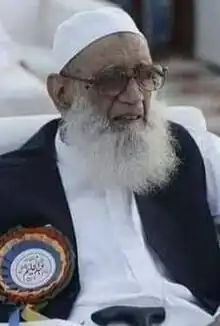Maulana Abdul Halim Chishti Nomani | |
|---|---|
مولانا ڈاکٹر عبدالحلیم چشتی نعمانی | |
 | |
| Personal | |
| Born | 16 April 1929 |
| Died | 12 October 2020 (aged 91) |
| Resting place | University of Karachi Cemetery |
| Religion | Islam |
| Education | MA in Islamic Studies Master in Library Science PhD in Library Science |
| Occupation | Islamic scholar, librarian, writer |
| Institute | University of Karachi Radio Pakistan Bayero University Kano Library Jamia Uloom Islamia |
| Muslim leader | |
| Teacher | Hussain Ahmad Madani Fateh Muhammad Panipati |
Abdul Halim Chishti Nomani (16 April 1929 – 12 October 2020) was a Pakistani Islamic scholar, librarian, writer and the first PhD in library sciences in Pakistan. He was a disciple of Hussain Ahmad Madani. He was head of the Department of Hadith Studies at Jamia Uloom Islamia and the younger brother of Abdul Rasheed Naumani.[1][2]
Early life and education
Abdul Haleem Chishti was born on 16 April 1929 in Jaipur, Rajasthan coinciding Zul Qaida 1347 AH. His father Abdul Rahim was a calligrapher and had memorized the Quran. Abdul Haleem received his early education at Madarsa Taleem ul Islam in Jaipur. In 1940, he entered Jamia Nizamia, in Hyderabad, where he studied Arabic and joined the Munshi Fazil course.[3][4] He went to Darul Uloom Deoband in 1363 AH for higher education and graduated in 1369 AH; where his teachers included Hussain Ahmad Madani.[3] He did an MA in Islamic studies from Karachi University in 1967, and a Masters in Library science in 1970. In 1981, he obtained the degree of PhD.[3]
Career
Chishti migrated after the creation of Pakistan, and initially settled in the Ranchhor line. In 1949, he worked in Radio Pakistan for two years, after that he took a government job in Liaquat National Library for 14 years, after that he served in University of Karachi for a long time, and for some time he was the Khatib of Karachi University Mosque.[3]
After leaving the University of Karachi in 1977, he moved to Nigeria, where he served for 10 years as a senior cataloger in the Bayero University Kano Library.[5] Then returned to Pakistan around 1987. In 1992–91, on the guidance and desire of Habibullah Mukhtar, he came to Jamia Uloom Islamia, Allama Banuri Town, as a specialist in Hadith Studies and after his return, he remained associated with the Jamia. Dozens of academic and research papers of PhD level have been written on the subject of Hadith science under his supervision, which have made their mark in the field of research, many of these papers have been published.[3]
Literary works
He authored more than a dozen books.[6]
Death
Chishti died on 12 October 2020. The first funeral prayer was performed at Jamia Tur Rasheed by Mufti Muhammad and he was buried in University of Karachi cemetery.[7]
See also
References
- ↑ "مولانا ڈاکٹر عبدالحلیم چشتی نعمانیؒ" [Maulana Dr. Abdul Halim Chishti Nomani]. jang.com.pk (in Urdu). 15 November 2020. Retrieved 20 November 2023.
- ↑ "نامور محدث و محقق مولانا ڈاکٹر عبدالحلیم چشتی انتقال کرگئے، انا للہ و انا الیہ راجعون" [Eminent Muhaddith and researcher Maulana Dr. Abdul Halim Chishti passed away] (in Urdu). 13 October 2020. Retrieved 20 November 2023.
- 1 2 3 4 5 ٹاؤن, جامعہ علوم اسلامیہ بنوری. "حضرت مولانا ڈاکٹر محمد عبدالحلیم چشتی رحمۃ اللہ علیہ کی رحلت | جامعہ علوم اسلامیہ علامہ محمد یوسف بنوری ٹاؤن" [Death of Hazrat Maulana Dr. Muhammad Abdul Halim Chishti | Jamia Uloom Islamia]. www.banuri.edu.pk (in Urdu). Retrieved 20 November 2023.
- ↑ ڈیسک, ویب (12 October 2020). "مولانا ڈاکٹر عبدالحلیم چشتی کون تھے ؟" [Who was Maulana Dr. Abdul Halim Chishti] (in Urdu). Retrieved 20 November 2023.
- ↑ Khan, Sadiq Ali (1994). Educational Institutions and Library Development in Pakistan. Khurshid Nishan. p. 171. ISBN 9789698271008.
- ↑ Maktaba Maulana Dr Abdul Haleem Chishti Sahib.
- ↑ "مولانا ڈاکٹر عبدالحلیم چشتی کراچی یونیورسٹی کے قبرستان میں سپردخاک" [Maulana Dr. Abdul Halim Chishti cremated at Karachi University Cemetery] (in Urdu). Express News. 13 October 2020. Retrieved 20 November 2023.